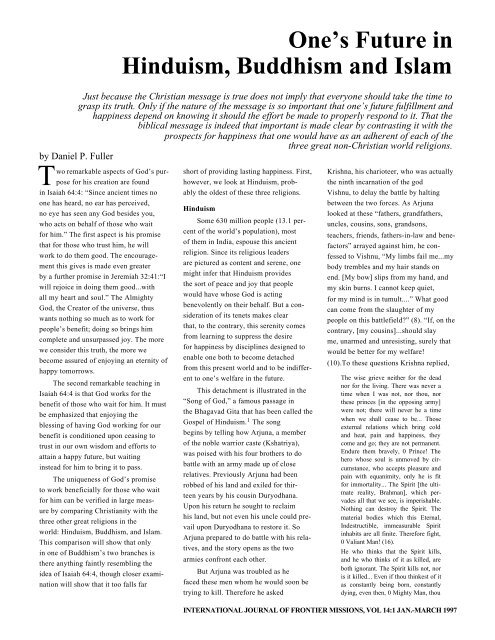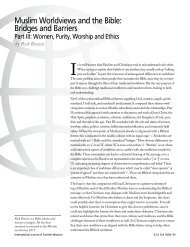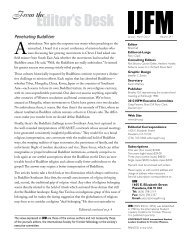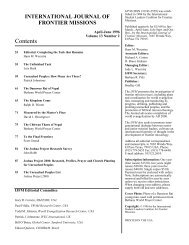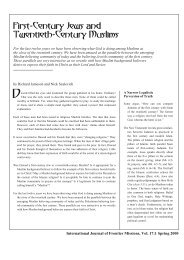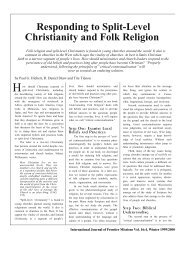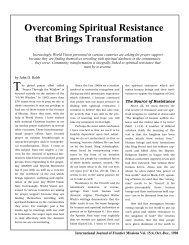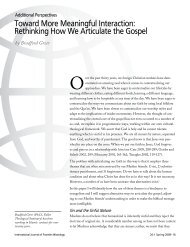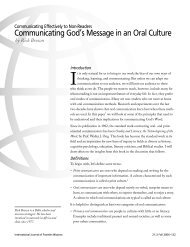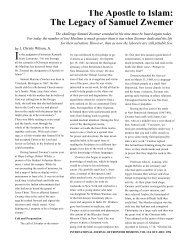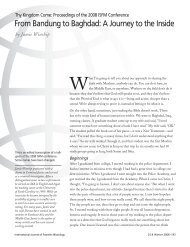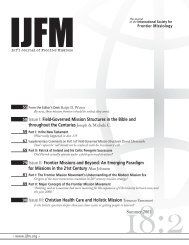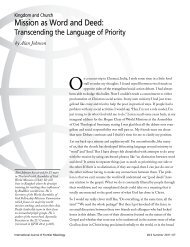One's Future in Hinduism, Buddhism and Islam - International ...
One's Future in Hinduism, Buddhism and Islam - International ...
One's Future in Hinduism, Buddhism and Islam - International ...
You also want an ePaper? Increase the reach of your titles
YUMPU automatically turns print PDFs into web optimized ePapers that Google loves.
One’s <strong>Future</strong> <strong>in</strong>H<strong>in</strong>duism, <strong>Buddhism</strong> <strong>and</strong> <strong>Islam</strong>Just because the Christian message is true does not imply that everyone should take the time tograsp its truth. Only if the nature of the message is so important that one’s future fulfillment <strong>and</strong>happ<strong>in</strong>ess depend on know<strong>in</strong>g it should the effort be made to properly respond to it. That thebiblical message is <strong>in</strong>deed that important is made clear by contrast<strong>in</strong>g it with theprospects for happ<strong>in</strong>ess that one would have as an adherent of each of thethree great non-Christian world religions.by Daniel P. FullerTwo remarkable aspects of God’s purposefor his creation are found<strong>in</strong> Isaiah 64:4: “S<strong>in</strong>ce ancient times noone has heard, no ear has perceived,no eye has seen any God besides you,who acts on behalf of those who waitfor him.” The first aspect is his promisethat for those who trust him, he willwork to do them good. The encouragementthis gives is made even greaterby a further promise <strong>in</strong> Jeremiah 32:41:“Iwill rejoice <strong>in</strong> do<strong>in</strong>g them good...withall my heart <strong>and</strong> soul.” The AlmightyGod, the Creator of the universe, thuswants noth<strong>in</strong>g so much as to work forpeople’s benefit; do<strong>in</strong>g so br<strong>in</strong>gs himcomplete <strong>and</strong> unsurpassed joy. The morewe consider this truth, the more webecome assured of enjoy<strong>in</strong>g an eternity ofhappy tomorrows.The second remarkable teach<strong>in</strong>g <strong>in</strong>Isaiah 64:4 is that God works for thebenefit of those who wait for him. It mustbe emphasized that enjoy<strong>in</strong>g thebless<strong>in</strong>g of hav<strong>in</strong>g God work<strong>in</strong>g for ourbenefit is conditioned upon ceas<strong>in</strong>g totrust <strong>in</strong> our own wisdom <strong>and</strong> efforts toatta<strong>in</strong> a happy future, but wait<strong>in</strong>g<strong>in</strong>stead for him to br<strong>in</strong>g it to pass.The uniqueness of God’s promiseto work beneficially for those who waitfor him can be verified <strong>in</strong> large measureby compar<strong>in</strong>g Christianity with thethree other great religions <strong>in</strong> theworld: H<strong>in</strong>duism, <strong>Buddhism</strong>, <strong>and</strong> <strong>Islam</strong>.This comparison will show that only<strong>in</strong> one of <strong>Buddhism</strong>’s two branches isthere anyth<strong>in</strong>g fa<strong>in</strong>tly resembl<strong>in</strong>g theidea of Isaiah 64:4, though closer exam<strong>in</strong>ationwill show that it too falls farshort of provid<strong>in</strong>g last<strong>in</strong>g happ<strong>in</strong>ess. First,however, we look at H<strong>in</strong>duism, probablythe oldest of these three religions.H<strong>in</strong>duismSome 630 million people (13.1 percentof the world’s population), mostof them <strong>in</strong> India, espouse this ancientreligion. S<strong>in</strong>ce its religious leadersare pictured as content <strong>and</strong> serene, onemight <strong>in</strong>fer that H<strong>in</strong>duism providesthe sort of peace <strong>and</strong> joy that peoplewould have whose God is act<strong>in</strong>gbenevolently on their behalf. But a considerationof its tenets makes clearthat, to the contrary, this serenity comesfrom learn<strong>in</strong>g to suppress the desirefor happ<strong>in</strong>ess by discipl<strong>in</strong>es designed toenable one both to become detachedfrom this present world <strong>and</strong> to be <strong>in</strong>differentto one’s welfare <strong>in</strong> the future.This detachment is illustrated <strong>in</strong> the“Song of God,” a famous passage <strong>in</strong>the Bhagavad Gita that has been called theGospel of H<strong>in</strong>duism. 1 The songbeg<strong>in</strong>s by tell<strong>in</strong>g how Arjuna, a memberof the noble warrior caste (Kshatriya),was poised with his four brothers to dobattle with an army made up of closerelatives. Previously Arjuna had beenrobbed of his l<strong>and</strong> <strong>and</strong> exiled for thirteenyears by his cous<strong>in</strong> Duryodhana.Upon his return he sought to reclaimhis l<strong>and</strong>, but not even his uncle could prevailupon Duryodhana to restore it. SoArjuna prepared to do battle with his relatives,<strong>and</strong> the story opens as the twoarmies confront each other.But Arjuna was troubled as hefaced these men whom he would soon betry<strong>in</strong>g to kill. Therefore he askedKrishna, his charioteer, who was actuallythe n<strong>in</strong>th <strong>in</strong>carnation of the godVishnu, to delay the battle by halt<strong>in</strong>gbetween the two forces. As Arjunalooked at these “fathers, gr<strong>and</strong>fathers,uncles, cous<strong>in</strong>s, sons, gr<strong>and</strong>sons,teachers, friends, fathers-<strong>in</strong>-law <strong>and</strong> benefactors”arrayed aga<strong>in</strong>st him, he confessedto Vishnu, “My limbs fail me...mybody trembles <strong>and</strong> my hair st<strong>and</strong>s onend. [My bow] slips from my h<strong>and</strong>, <strong>and</strong>my sk<strong>in</strong> burns. I cannot keep quiet,for my m<strong>in</strong>d is <strong>in</strong> tumult....” What goodcan come from the slaughter of mypeople on this battlefield?” (8). “If, on thecontrary, [my cous<strong>in</strong>s]...should slayme, unarmed <strong>and</strong> unresist<strong>in</strong>g, surely thatwould be better for my welfare!(10).To these questions Krishna replied,The wise grieve neither for the deadnor for the liv<strong>in</strong>g. There was never atime when I was not, nor thou, northese pr<strong>in</strong>ces [<strong>in</strong> the oppos<strong>in</strong>g army]were not; there will never he a timewhen we shall cease to be... Thoseexternal relations which br<strong>in</strong>g cold<strong>and</strong> heat, pa<strong>in</strong> <strong>and</strong> happ<strong>in</strong>ess, theycome <strong>and</strong> go; they are not permanent.Endure them bravely, 0 Pr<strong>in</strong>ce! Thehero whose soul is unmoved by circumstance,who accepts pleasure <strong>and</strong>pa<strong>in</strong> with equanimity, only he is fitfor immortality... The Spirit [the ultimatereality, Brahman], which pervadesall that we see, is imperishable.Noth<strong>in</strong>g can destroy the Spirit. Thematerial bodies which this Eternal,Indestructible, immeasurable Spirit<strong>in</strong>habits are all f<strong>in</strong>ite. Therefore fight,0 Valiant Man! (16).He who th<strong>in</strong>ks that the Spirit kills,<strong>and</strong> he who th<strong>in</strong>ks of it as killed, areboth ignorant. The Spirit kills not, noris it killed... Even if thou th<strong>in</strong>kest of itas constantly be<strong>in</strong>g born, constantlydy<strong>in</strong>g, even then, 0 Mighty Man, thouINTERNATIONAL JOURNAL OF FRONTIER MISSIONS, VOL 14:1 JAN.-MARCH 1997
16One’s <strong>Future</strong> <strong>in</strong> H<strong>in</strong>duism, <strong>Buddhism</strong> <strong>and</strong> <strong>Islam</strong>still hast not cause to grieve. Fordeath is as sure for that which is born,as birth is for that which is dead.Therefore grieve not for what is <strong>in</strong>evitable.(17)[Brahman] the end <strong>and</strong> beg<strong>in</strong>n<strong>in</strong>g ofbe<strong>in</strong>gs [is] unknown. We see only the<strong>in</strong>terven<strong>in</strong>g formations... Thoughmany are told about [Brahman],scarcely is there one who knows It.[Therefore] thou must look at thyduty. Noth<strong>in</strong>g can be more welcometo a soldier than a righteous war...Refuse to fight <strong>in</strong> this righteous cause,<strong>and</strong> thou wilt be a traitor... <strong>in</strong>curr<strong>in</strong>gonly s<strong>in</strong>... To the noble, dishonor isworse than death... If killed, thoushalt atta<strong>in</strong> Heaven; if victorious,enjoy the k<strong>in</strong>gdom of earth... Lookupon pleasure <strong>and</strong> pa<strong>in</strong>, victory <strong>and</strong>defeat, with an equal eye. Make readyfor combat, <strong>and</strong> thou shalt commit nos<strong>in</strong>. (18)Several facets of H<strong>in</strong>du th<strong>in</strong>k<strong>in</strong>gare apparent <strong>in</strong> this exchange betweenArjuna <strong>and</strong> Krishna. First, there isBrahman, an impersonal reality at theheart of everyth<strong>in</strong>g <strong>in</strong> the universe.Here all the apparent opposites of the visibleworld for example, “cold <strong>and</strong>heat, pa<strong>in</strong> <strong>and</strong> happ<strong>in</strong>ess, victory <strong>and</strong>defeat” meld together as one. Second,between phenomenal <strong>in</strong>dividuals <strong>and</strong> thenoumenal, impersonal Brahman are“<strong>in</strong>terven<strong>in</strong>g formations.” These arecaused by what H<strong>in</strong>duism calls maya,someth<strong>in</strong>g of an illusion, so that peoplef<strong>in</strong>d it easy to regard as real the opposites<strong>in</strong> the phenomenal world aroundthem.The H<strong>in</strong>du concept of righteousnessalso becomes evident. It is one’s relationshipto dharma (the “law,” “custom,”or“order”) that spells out theduties the members of each caste areobliged to perform. Thus <strong>in</strong> the BhagavadGita we see Krishna’s argument toArjuna that s<strong>in</strong> is not kill<strong>in</strong>g reveredrelatives <strong>and</strong> friends but fail<strong>in</strong>g to behaveas one who is a member of the warriorcaste.Another facet of H<strong>in</strong>du th<strong>in</strong>k<strong>in</strong>gis yoga, the discipl<strong>in</strong>e necessary for go<strong>in</strong>gbeyond the illusory phenomenalworld <strong>and</strong> becom<strong>in</strong>g conscious of the noumenalworld of Brahman.“But thouhast only the right to work, but none tothe fruit thereof. Let not then the fruitof thy action be thy motive; nor yet bethou enamoured of <strong>in</strong> action. Performall thy actions with m<strong>in</strong>d concentrated onthe Div<strong>in</strong>e [Brahman], renounc<strong>in</strong>gattachment <strong>and</strong> look<strong>in</strong>g upon success <strong>and</strong>failure with an equal eye. Spirituality[yoga] implies equanimity” (21).Arjuna, however, regarded thisteach<strong>in</strong>g as hard to follow <strong>and</strong> thusobjected to Krishna. “I do not seehow I can atta<strong>in</strong> this state of equanimitywhich Thou hast revealed, ow<strong>in</strong>g tothe restlessness of my m<strong>in</strong>d. My Lord!Verily, the m<strong>in</strong>d is fickle <strong>and</strong> turbulent,obst<strong>in</strong>ate <strong>and</strong> strong, yea. extremelydifficult as the w<strong>in</strong>d to control.”Krishna agreed that the m<strong>in</strong>d is “exceed<strong>in</strong>glydifficult to restra<strong>in</strong>, but... withpractice <strong>and</strong> renunciation it can be done.”(65).Verily this Div<strong>in</strong>e Illusion of Phenomenonmanifest<strong>in</strong>g itself <strong>in</strong> theQualities is difficult to surmount.Only they who devote themselves toMe <strong>and</strong> to Me alone can accomplishit... Who meditates on Me withoutceas<strong>in</strong>g, devot<strong>in</strong>g himself only to Me,he is the best... After many lives, atlast the wise man realizes Me as I am.A man so enlightened that he seesGod [Brahman] everywhere is verydifficult to f<strong>in</strong>d... I am not visible toall, for I am enveloped by the illusionof Phenomenon. This deluded worlddoes not know Me as the Unborn <strong>and</strong>the Imperishable [i.e. Brahman]. (72)[But] to him who th<strong>in</strong>ks constantly ofMe, <strong>and</strong> of noth<strong>in</strong>g else, to such anever faithful devotee, 0 Arjuna, am Iever accessible. Com<strong>in</strong>g thus to Me,these great souls go no more to themisery <strong>and</strong> death of earthly life, forthey have ga<strong>in</strong>ed perfection. Theworlds, with the whole realm of creation,come <strong>and</strong> go; but, O Arjuna,whoso comes to Me, for him there isno rebirth. (80)In truth, therefore, there is the EternalUnmanifest, which is beyond <strong>and</strong>above the Unmanifest Spirit of Creation...The wise say that the Unmanifest<strong>and</strong> Indestructible [Brahman] isthe highest goal of all; when onceThat is reached, there is no return.That is My Blessed Home. (82)Karma <strong>and</strong> “rebirth” are alsoimportant facets of H<strong>in</strong>du th<strong>in</strong>k<strong>in</strong>g.Karma is the degree of merit <strong>in</strong> achiev<strong>in</strong>gdetachment from the phenomenalworld that one has achieved <strong>in</strong> previouslifetimes <strong>and</strong> to date <strong>in</strong> the presentlife. Krishna spoke of it to Arjuna as follows:No evil fate awaits him who treadsthe path of righteousness. Hav<strong>in</strong>greached the world where the righteousdwell, <strong>and</strong> hav<strong>in</strong>g rema<strong>in</strong>ed there formany years, he who has slipped awayfrom the path of spirituality will beborn aga<strong>in</strong> <strong>in</strong> the family of the pure,benevolent <strong>and</strong> prosperous... Then theexperience acquired <strong>in</strong> his former lifewill revive, <strong>and</strong> with its help he willstrive for perfection more eagerlythan before. Unconsciously he willreturn to the practices of his old life;so that he who tries to realize spiritualconsciousness is certa<strong>in</strong>ly superior toone who only talks of it. Then, aftermany lives, the student of spirituality,who earnestly strives, <strong>and</strong> whose s<strong>in</strong>sare absolved, atta<strong>in</strong>s perfection <strong>and</strong>reaches the Supreme. (66)The task of reach<strong>in</strong>g the “Supreme”or the “Blessed Home” of Brahmanthus is formidable. Only a “veryfew”devote all efforts to becom<strong>in</strong>gspiritual. These must meditate withoutceas<strong>in</strong>g on the noumenal aspect ofKrishna, or on one of the other aspects ofBrahman such as the gods Shiva orBrahm<strong>in</strong>. They must also renounce allthought of the rewards they will ga<strong>in</strong>from their labor to susta<strong>in</strong> life. No doubtthe “restless m<strong>in</strong>d” can be stilled for afew hours by rigorous exercises <strong>in</strong> meditat<strong>in</strong>gon the illusory nature of thephenomenal world press<strong>in</strong>g <strong>in</strong> on allsides. But such awesome forces asone’s complete immersion <strong>in</strong> this phenomenalworld <strong>and</strong> the m<strong>in</strong>d’s<strong>in</strong>st<strong>in</strong>ctive <strong>in</strong>cl<strong>in</strong>ation to choose activitiesthat will br<strong>in</strong>g ga<strong>in</strong> from one’s workwill soon aga<strong>in</strong> concentrate one’sthoughts upon the illusory phenomenalworld. Thus one’s karma rat<strong>in</strong>g willdecl<strong>in</strong>e. And the pa<strong>in</strong>ful knowledgethat one tends to live life exactly as it waslived <strong>in</strong> previous <strong>in</strong>carnations wouldtend to ext<strong>in</strong>guish any hope of success <strong>in</strong>constantly meditat<strong>in</strong>g on the noumenalBrahman.INTERNATIONAL JOURNAL OF FRONTIER MISSIONS
Daniel P. Fuller17In contrast to H<strong>in</strong>duism, all that isrequired of those who desire bless<strong>in</strong>gsfrom the omnipotent <strong>and</strong> omniscient Godof the Bible is to wait for him <strong>in</strong> thesense of bank<strong>in</strong>g all their confidence for ahappy future on the many promiseshe has made. So the future happ<strong>in</strong>ess onemay have as set forth <strong>in</strong> the Bible isvastly more atta<strong>in</strong>able than that offered tothe H<strong>in</strong>du. And s<strong>in</strong>ce all humanitycraves happ<strong>in</strong>ess, H<strong>in</strong>dus<strong>in</strong>cluded, are therefore welladvised to expend the time <strong>and</strong>effort necessary to learnGod’s whole purpose <strong>in</strong> historyas set forth <strong>in</strong> the Bible.<strong>Buddhism</strong><strong>Buddhism</strong> emergedfrom a H<strong>in</strong>du context <strong>in</strong> the personof Siddharta Gautama,born around 560 B.C. <strong>in</strong> a town<strong>in</strong> Nepal, near the northern border ofIndia. Currently 556 million people (11.5percent of the world’s population)adhere generally to one of two basicforms of <strong>Buddhism</strong>. The orig<strong>in</strong>alteach<strong>in</strong>gs of Gautama are most recognizable<strong>in</strong> southern Asia (Sri Lanka,Burma, Thail<strong>and</strong>, Kampuchea, <strong>and</strong> Laos),although even here it has undergonevariations. In Sri Lanka, for example, it iscomb<strong>in</strong>ed with astrology <strong>and</strong> manyelements of primitive animism–ideas thatBuddha himself would have spurned.Fear of unknown forces is a verypowerful controll<strong>in</strong>g factor <strong>in</strong> thelives of many Buddhists <strong>and</strong> H<strong>in</strong>dus<strong>in</strong> Sri Lanka. They go regularly toastrologers, shr<strong>in</strong>es, medic<strong>in</strong>e men,exorcists, or such people, who claimto have power to control or directsupernatural forces. When the peopleare faced with sickness or some suchtrouble, they ask, “Is this because of acharm or an evil spirit?” If so, theywant to counteract the evilforces,us<strong>in</strong>g whatever means availableto them. 2A different sort of <strong>Buddhism</strong> is found<strong>in</strong> Tibet, parts of the Soviet Union,Mongolia, Ch<strong>in</strong>a, Taiwan, Vietnam,Korea, <strong>and</strong> Japan. In dist<strong>in</strong>ction tothat of much of southern Asia, this northernform calls itself Mahayana(“Upper Vehicle”) <strong>Buddhism</strong>. S<strong>in</strong>ce thistitle implies that the <strong>Buddhism</strong> <strong>in</strong>parts of southern Asia is <strong>in</strong>ferior, its followers<strong>in</strong> the South prefer to call theirreligion Theravada <strong>Buddhism</strong>, or “The<strong>Buddhism</strong> of the Elders.” A considerationof this earlier form is necessary <strong>in</strong>order to underst<strong>and</strong> Mahayana <strong>Buddhism</strong>.S<strong>in</strong>ce all humanity craveshapp<strong>in</strong>ess, H<strong>in</strong>dus <strong>in</strong>cluded,are therefore well advised toexpend the time <strong>and</strong> effortnecessary to learn God’s wholepurpose <strong>in</strong> history as setforth <strong>in</strong> the Bible.The <strong>Buddhism</strong> of the EldersSiddharta Gautama, or Buddha (“theenlightened one”), a name Gautamareceived from his followers, was born <strong>in</strong>toa wealthy family liv<strong>in</strong>g <strong>in</strong> a palace asisolated as possible from the misery, poverty,<strong>and</strong> death <strong>in</strong> the world outside .3But one day at age twenty-n<strong>in</strong>e, married<strong>and</strong> the father of a small child, Siddhartadisobeyed his father’s order neverto leave the palace grounds <strong>and</strong> wentout to see how the rest of the world lived.So profoundly shocked was he at thespectacle of death, poverty, <strong>and</strong> humansuffer<strong>in</strong>g outside his palace that a fewnights later he left his sleep<strong>in</strong>g wife <strong>and</strong>child <strong>and</strong> departed, never to return.Donn<strong>in</strong>g the saffron robes of a w<strong>and</strong>er<strong>in</strong>gbeggar, shav<strong>in</strong>g his head, <strong>and</strong>generally follow<strong>in</strong>g H<strong>in</strong>du teach<strong>in</strong>g, hetried to block out the phenomenalworld of suffer<strong>in</strong>g <strong>and</strong> reach Brahmanthrough meditat<strong>in</strong>g <strong>and</strong> subject<strong>in</strong>ghimself to ascetic extremes. But thoughhe persisted <strong>in</strong> this regimen for sixyears, he found no relief from the problemof suffer<strong>in</strong>g.Therefore he ab<strong>and</strong>oned such efforts,<strong>and</strong> while sitt<strong>in</strong>g under a tree, latercalled the Bodhi (“knowledge”) Tree, hedecided upon a new approach. Theprevious six years, he was conv<strong>in</strong>ced, hadbrought no enlightenment because hehad sought it with the very same selfishdesire that causes so much suffer<strong>in</strong>g<strong>in</strong> the world. Therefore he ab<strong>and</strong>oned hisefforts to get through to Brahman byrigorous efforts to concentrate on one ofits manifestations such as Krishna,choos<strong>in</strong>g <strong>in</strong>stead to follow a morerelaxed “middle way” of liv<strong>in</strong>g.Seven weeks later fullenlightenment f<strong>in</strong>ally came.Go<strong>in</strong>g then to a public place <strong>in</strong> thenearby city of Benares, India,he began to teach this new way toatta<strong>in</strong> peace <strong>in</strong> a world of suffer<strong>in</strong>g.As he taught, he radiatedsuch calm <strong>and</strong> self-possessionthat ascetics who had known himdur<strong>in</strong>g the first six yearsbecame conv<strong>in</strong>ced that he truly hadreceived a remarkable enlightenment.And so for the rema<strong>in</strong><strong>in</strong>g forty-five yearsof his life, he tirelessly traveledthroughout northern India preach<strong>in</strong>g hismessage <strong>and</strong> radiat<strong>in</strong>g his serenity.An <strong>in</strong>creas<strong>in</strong>gly large number of menfrom different castes began to followhis precepts, <strong>and</strong> <strong>in</strong> time women too wereallowed, to become <strong>in</strong>itiated <strong>in</strong>to anorder.Siddharta summarized hisenlightenment <strong>in</strong> “Four Noble Truths”:(1) suffer<strong>in</strong>g is universal; (2) thecause of suffer<strong>in</strong>g is attachment to th<strong>in</strong>gsor a crav<strong>in</strong>g for them; (3) the cure forsuffer<strong>in</strong>g is the elim<strong>in</strong>ation of crav<strong>in</strong>g <strong>and</strong>attachment by (4) follow<strong>in</strong>g the “middleway.” This middle way obviouslymeant avoid<strong>in</strong>g one extreme of giv<strong>in</strong>g<strong>in</strong>to carnal lusts. But it also meant avoid<strong>in</strong>gthe opposite extreme of crav<strong>in</strong>gknowledge of Brahman <strong>in</strong> the H<strong>in</strong>du wayof asceticism. To elucidate this middleway Siddharta advocated the EightfoldPath.The first step of the Eightfold Path isright belief. Part of this right belief isto waste no time <strong>and</strong> energy try<strong>in</strong>g toVOL 14:1 JAN.-MARCH 1997
18One’s <strong>Future</strong> <strong>in</strong> H<strong>in</strong>duism, <strong>Buddhism</strong> <strong>and</strong> <strong>Islam</strong>answer metaphysical questions as towhether the world is created, is temporalor eternal, f<strong>in</strong>ite or <strong>in</strong>f<strong>in</strong>ite, orwhether the life pr<strong>in</strong>ciple of a personis identical with the body or dist<strong>in</strong>ct fromit. Suffer<strong>in</strong>g still exists no matterwhat answers are given to such theoreticalquestions. Effort should therefore bedevoted <strong>in</strong>stead to foster<strong>in</strong>g worthy attitudes<strong>and</strong> practical ethical behavior.One must avoid modes of behavior thatcause suffer<strong>in</strong>g such as kill<strong>in</strong>g, steal<strong>in</strong>g,immorality, ly<strong>in</strong>g, tale-bear<strong>in</strong>g, harshlanguage, covetousness, <strong>and</strong> ill will.The second step, right m<strong>in</strong>dedness,requires carry<strong>in</strong>g on one’s activitiesfrom a proper motive. While this step naturally<strong>in</strong>cludes reject<strong>in</strong>g the motivesthat lead to forbidden behavior, it alsoemphasizes the need to carry on one’sactivities with a wisdom that will alleviatesuffer<strong>in</strong>g <strong>in</strong> oneself <strong>and</strong> others.The third <strong>and</strong> fourth steps, rightspeech <strong>and</strong> right action, repeat muchof step 1. The fifth step of right liv<strong>in</strong>gconcerns choos<strong>in</strong>g a life vocation thatbr<strong>in</strong>gs benefit rather than hurt to society.Right effort, the sixth step, spells outthe four virtues one needs to foster: avoidanceof evil, overcom<strong>in</strong>g of lust <strong>and</strong>bad habits, development of helpful words<strong>and</strong> actions, <strong>and</strong> ma<strong>in</strong>tenance of thesort of behavior that will help eradicatesuffer<strong>in</strong>g.The seventh step of right attentivenessalso s<strong>in</strong>gles out four objects—the body, the emotions, the m<strong>in</strong>d, <strong>and</strong>worldly phenomena—from which somuch suffer<strong>in</strong>g can come until one learns,for example, not to love the beautifulor strong parts of the body, because theywill wither <strong>and</strong> die as readily as thebody’s uglier <strong>and</strong> weaker parts.Right concentration then br<strong>in</strong>gsthe Eightfold Path to a climax. Thosemak<strong>in</strong>g progress <strong>in</strong>to this eighth stepshould beg<strong>in</strong> to experience the joy oftrances that are a foretaste of nirvana,where one never aga<strong>in</strong> has to be reborn<strong>in</strong>to the world of suffer<strong>in</strong>g.True to his distaste for metaphysicalspeculation, Buddha was vague <strong>in</strong>describ<strong>in</strong>g nirvana, which means literallythe“blow<strong>in</strong>g out” of existence. Thisconcept would seem to imply annihilation,a conclusion that Buddha neveraffirmed. All that mattered to himconcern<strong>in</strong>g this subject was that it markedthe end of pa<strong>in</strong>ful becom<strong>in</strong>g <strong>and</strong> thebeg<strong>in</strong>n<strong>in</strong>g of the peace of an eternal,changeless state of be<strong>in</strong>g. Those dest<strong>in</strong>edfor nirvana after their last lifetimewould await death with calm detachment<strong>and</strong> contentment.In dist<strong>in</strong>ction to the H<strong>in</strong>duismfrom which it sprang, <strong>Buddhism</strong> could becharacterized as a humanistic, even asan atheistic, religion. It did, however,carry over <strong>in</strong>to its teach<strong>in</strong>g two somewhatrevised features of H<strong>in</strong>duism: karma<strong>and</strong> rebirth. Buddha reiterated theconcept of karma, whereby one’s meritfrom a preced<strong>in</strong>g life would determ<strong>in</strong>ethe status atta<strong>in</strong>ed <strong>in</strong> a future one.But his underst<strong>and</strong><strong>in</strong>g of karmaallowed people to be much more optimisticabout their future than they couldbe <strong>in</strong> H<strong>in</strong>duism. “In [Buddha’s]view aman of any caste or class could experienceso complete a change of heart ordisposition as to escape the full consequencesof s<strong>in</strong>s committed <strong>in</strong> previousexistences... [The Law of Karma]could not lay hold upon a man... who hadachieved arahatship, “the state of himthat is worthy,” 4 the last step of the EightfoldPath. This arahatship, or spirituality,canceled out the past karma thatheretofore had determ<strong>in</strong>ed the qualityof one’s next life. So <strong>in</strong> Buddha’s teach<strong>in</strong>ga spiritual person, or arahat,would live eternally <strong>in</strong> nirvana <strong>and</strong> neverbecome a part of the pa<strong>in</strong>ful world offlux aga<strong>in</strong>.<strong>Buddhism</strong> also dist<strong>in</strong>guisheditself from H<strong>in</strong>duism <strong>in</strong> that Buddha <strong>and</strong>his followers were to foster a benevolentattitude toward others. So, for example,the sixth step of the EightfoldPath decreed that one should choose avocation that contributed to the wellbe<strong>in</strong>g of society. Buddhists were also toma<strong>in</strong>ta<strong>in</strong> a lov<strong>in</strong>g rather than an unconcernedor vengeful attitude towardothers, which was essential to have peaceof soul. This emphasis on love figuredlargely <strong>in</strong> the rise of “Upper Vehicle”<strong>Buddhism</strong>, which became prom<strong>in</strong>entaround A.D.100 after go<strong>in</strong>g throughseveral modifications.Mahayana (“Upper Vehicle”) <strong>Buddhism</strong>The first modification came fromthe strong <strong>in</strong>fluence of K<strong>in</strong>g Asoka, whobecame ruler of all India <strong>in</strong> the thirdcentury B.C. To secure such powerrequired his deal<strong>in</strong>g cruelly with thepeople who lived alongside the Bay ofBengal, though the Buddhist teach<strong>in</strong>ghe had already received condemned himfor such violence. Asoka decided tomake <strong>Buddhism</strong> the official religion ofIndia but expounded it as a system ofpiety whereby people could be good Buddhistssimply by carry<strong>in</strong>g on normallives, without hav<strong>in</strong>g to become monks ornuns.Another step toward Mahayana <strong>Buddhism</strong>was the virtual deification ofBuddha. Although Buddha himself hadasserted that there were many gods <strong>in</strong>the universe, he discouraged prayer ordevotion to any of them, s<strong>in</strong>ce they,like human be<strong>in</strong>gs, were f<strong>in</strong>ite <strong>and</strong> subjectto the pa<strong>in</strong> that comes from the fluxof life. Buddha himself never encouragedpeople to direct prayers to him afterhe died <strong>and</strong> entered nirvana. But <strong>in</strong> orderto spread his teach<strong>in</strong>gs, his followershad come to build sanctuaries called“wats,” where ord<strong>in</strong>ary people couldassemble to be <strong>in</strong>structed by monks. Mostof these wats had an image of Buddhaseated above the altar.Although the well-tra<strong>in</strong>ed monksregarded prayers as noth<strong>in</strong>g more thanrepetitions that earned merit, the commonpeople began to direct their prayerstoward Buddha himself. They sawhim as one who would help them <strong>in</strong> theirneed because he had fostered a benevolentattitude toward others <strong>and</strong> nowenjoyed the transcendence of be<strong>in</strong>g <strong>in</strong>the changeless nirvana. It was then but aINTERNATIONAL JOURNAL OF FRONTIER MISSIONS
Daniel P. Fuller19short step to th<strong>in</strong>k of Buddha as hav<strong>in</strong>gpreexisted before com<strong>in</strong>g down toearth to tell people how to ga<strong>in</strong> alleviationfrom suffer<strong>in</strong>g. To this notion wasadded the idea that he was a div<strong>in</strong>e omniscientbe<strong>in</strong>g who had repeatedly volunteeredto be <strong>in</strong>carnated on earth to blesspeople with his teach<strong>in</strong>gs.It was then anothershort step to the beliefthat Buddha had lived s<strong>in</strong>lesslydur<strong>in</strong>g these <strong>in</strong>carnations<strong>and</strong> therefore hadearned enough merit todwell <strong>in</strong> Tusita, the mostdesirable heaven.The third step <strong>in</strong> <strong>Buddhism</strong>’smodificationcame with the belief thatmany such buddhas hadcome to earth before SiddhartaGautama <strong>and</strong> thatothers would come after him. Thus theidea took shape that the universe wasfull of compassionate be<strong>in</strong>gs who wantedto aid suffer<strong>in</strong>g humanity. Now peoplesought salvation not just by the FourNoble Truths <strong>and</strong> the Eightfold Pathbut by look<strong>in</strong>g to these buddhas as div<strong>in</strong>ebe<strong>in</strong>gs with vast stores of merit thatthey were eager to share with the faithfulso they too could enjoy the bless<strong>in</strong>gsof heaven. This exceed<strong>in</strong>gly hopeful messagecarried by Mahayana <strong>Buddhism</strong>caused it to spread much more rapidlythan the orig<strong>in</strong>al form. By the secondcentury A.D. it was found throughout thel<strong>and</strong>s generally north of the Himalayas-Tibet,Ch<strong>in</strong>a (<strong>in</strong>clud<strong>in</strong>g Vietnam),Mongolia, Korea, <strong>and</strong> Japan.Mahayana <strong>Buddhism</strong> taught that ord<strong>in</strong>arypeople who were well on theirway toward the f<strong>in</strong>al step on the EightfoldPath were bodhisattvas (“Buddhas <strong>in</strong>the mak<strong>in</strong>g”). But when they died, <strong>in</strong>steadof enter<strong>in</strong>g nirvana, they wouldchoose another rebirth, so that they mighthelp thous<strong>and</strong>s more learn the way tonirvana. The greatest of these bodhisattvashad chosen rebirth rather than nirvanathous<strong>and</strong>s of times, <strong>and</strong> as a resultOrd<strong>in</strong>ary people simply couldnot be satisfied with its<strong>in</strong>difference to transcendentalmatters. Their needs impelthem to reach out for anomniscient, omnipotent, <strong>and</strong>lov<strong>in</strong>g God to answer theirprayers <strong>and</strong> deliver themfrom the difficulties of this life.had acquired so much merit that they dispensedit from a heavenly place tothose who worshiped them <strong>and</strong> directedprayers to them. Noss observes that“this merit is so great that they could readilyachieve the full status of Buddhas<strong>and</strong> pass <strong>in</strong>to nirvana; but they are compassionatebe<strong>in</strong>gs who out of love <strong>and</strong>pity for suffer<strong>in</strong>g humanity postpone theirentrance <strong>in</strong>to nirvana <strong>and</strong> transfertheir merit, as need arises, to those whocall upon them <strong>in</strong> prayer <strong>and</strong> givedevotional thought to them.” 5The follow<strong>in</strong>g statement from aPrajnaparamita Sutra (“teach<strong>in</strong>gs concern<strong>in</strong>gtranscendental wisdom”) writtensoon after the first century A.D., expla<strong>in</strong>sthe motivation of such a be<strong>in</strong>g.Doers of what is hard are the Boddhisattvas,the great be<strong>in</strong>gs who have setout to w<strong>in</strong> supreme enlightenment.They do not wish to atta<strong>in</strong> their ownprivate nirvana. On the contrary, theyhave surveyed the highly pa<strong>in</strong>fulworld of be<strong>in</strong>g, <strong>and</strong> yet, desirous tow<strong>in</strong> supreme enlightenment, they donot tremble at birth-<strong>and</strong>-death [offuture lives on earth]. They have setout for the benefit of the world, for theease of the world, out of pity for theworld. They have resolved: “We willbecome a shelter for the world, a refugefor the world, the world’s place ofrest, the f<strong>in</strong>al relief of the world,isl<strong>and</strong>s of the world, lights of theworld, leaders of the world, theworld’s means of salvation. 6One such bodhisattva is Amitabha,a great god revered <strong>in</strong> Ch<strong>in</strong>a,Korea, <strong>and</strong> Japan. Accord<strong>in</strong>g to Noss,The hopeful devotee turns to Amitabha,<strong>and</strong> has merit transferred tohim from the great be<strong>in</strong>g’s store. AMahayana treatise widely read <strong>in</strong>Ch<strong>in</strong>a <strong>and</strong> Japan, “A Description ofthe L<strong>and</strong> of Bliss” says dist<strong>in</strong>ctly thatfaith <strong>in</strong> Amitabha, quite apart frommeritorious works <strong>and</strong> deeds, is alonesufficient unto salvation. It declares:Be<strong>in</strong>gs are not born <strong>in</strong> that Buddhacountry as a reward <strong>and</strong> resultof good works performed <strong>in</strong>this present life. No, all men orwomen who hear <strong>and</strong> bear <strong>in</strong>m<strong>in</strong>d for one, two, three, four,five, six, or seven nights thename of Amitayus [an emanationfrom Amitabha], whenthey come to die, Amitayuswill st<strong>and</strong> before them <strong>in</strong> thehour of death, [<strong>and</strong>] they willdepart this life with quietm<strong>in</strong>ds, <strong>and</strong> after death they willbe born <strong>in</strong> Paradise. 7Is Mahayana <strong>Buddhism</strong>then, like Christianity, a religion ofhope for the future?An Evaluation of <strong>Buddhism</strong>Unquestionably the orig<strong>in</strong>al <strong>Buddhism</strong>,the “Teach<strong>in</strong>g of the Elders,”ismore encourag<strong>in</strong>g than H<strong>in</strong>duism <strong>in</strong>that it affirms that one can break out ofthe dest<strong>in</strong>y one’s karma, ga<strong>in</strong>edthrough countless previous rebirths,would otherwise decree for one.Through a far-reach<strong>in</strong>g repentance, onecould be born <strong>in</strong>stead <strong>in</strong>to a much betterform of existence <strong>in</strong> the next life. It isalso more encourag<strong>in</strong>g <strong>in</strong> that itclearly teaches that with the atta<strong>in</strong>ment ofnirvana, one will never aga<strong>in</strong> bereborn <strong>in</strong>to this world of flux <strong>and</strong> suffer<strong>in</strong>g.But the very changes that tookplace <strong>in</strong> the years follow<strong>in</strong>g Buddha’sdeath <strong>in</strong>dicate that this earlier formtoo left much to be desired.Ord<strong>in</strong>ary people simply could notbe satisfied with its <strong>in</strong>difference to transcendentalmatters. Their needs impelthem to reach out for an omniscient,omnipotent, <strong>and</strong> lov<strong>in</strong>g God toanswer their prayers <strong>and</strong> deliver themfrom the difficulties of this life. Peoplealso want def<strong>in</strong>ite teach<strong>in</strong>gs about theafterlife, <strong>and</strong> so later <strong>Buddhism</strong> cameto talk about specific heavens whose<strong>in</strong>habitants have not lost their identityVOL 14:1 JAN.-MARCH 1997
20One’s <strong>Future</strong> <strong>in</strong> H<strong>in</strong>duism, <strong>Buddhism</strong> <strong>and</strong> <strong>Islam</strong>as <strong>in</strong>dividuals. Also necessary is a religion<strong>in</strong> which men <strong>and</strong> women can participatefully without becom<strong>in</strong>g monks ornuns but can carry on the ord<strong>in</strong>aryvocations essential for society’s wellbe<strong>in</strong>g.The subsequent changes both <strong>in</strong> theorig<strong>in</strong>al “Teach<strong>in</strong>g of the Elders” <strong>and</strong><strong>in</strong> the development of Mahayana <strong>Buddhism</strong>demonstrate how <strong>Buddhism</strong>added those features for which peopleyearn. As a result the teach<strong>in</strong>g regard<strong>in</strong>gthe foremost bodhisattvas of Mahayana<strong>Buddhism</strong> comes close to compet<strong>in</strong>gwith the Bible’s teach<strong>in</strong>g that Godwill rejoice with his whole heart <strong>and</strong>soul to work for the welfare of the peoplewho wait for him. That the greatBodhisattva, Amitabha, will br<strong>in</strong>g to paradisea person who does noth<strong>in</strong>g morethan meditate on his name for one daybefore death, sounds as if div<strong>in</strong>ebless<strong>in</strong>g could be received by grace. It isopen to abuse, however, by those whowish to live s<strong>in</strong>fully dur<strong>in</strong>g this life butnevertheless spend eternity <strong>in</strong> paradise—providedthey could accurately predictwhen they would die. I certa<strong>in</strong>lydo not suggest that all who revere Amitabhaare like that, for the teachers ofMahayana <strong>Buddhism</strong> urge people to befull of good works <strong>and</strong> to aspire tobecome bodhisattvas themselves.Nevertheless the problem aris<strong>in</strong>gfrom the possible abuse of Amitabha’sgrace does exist, which could neverarise with the God of the Bible, whoworks for those who simply wait forhim. Wait<strong>in</strong>g for God means bank<strong>in</strong>gone’s hope for an eternity of happytomorrows exclusively upon what Godhas promised to do; it means hav<strong>in</strong>ghim as one’s hope for the future. Accord<strong>in</strong>gto Psalm 33:20, “We wait <strong>in</strong> hopefor the Lord; he is our help <strong>and</strong> ourshield.” A pronounced change of conductthen occurs <strong>in</strong> those hav<strong>in</strong>g such confidence<strong>in</strong> what the lov<strong>in</strong>g <strong>and</strong>supreme Creator-God of the universe willdo for them, for such a hope is theroot cause of all virtuous liv<strong>in</strong>g. PeopleINTERNATIONAL JOURNAL OF FRONTIER MISSIONSwho confidently wait for God to br<strong>in</strong>gthem the desired fulfillment for theirlives will not abuse others <strong>and</strong> use themas means whereby they might ga<strong>in</strong>some happ<strong>in</strong>ess for the future. Insteadthey seek to serve others, becausethey know that God will provide for everyneed. All would feel at ease liv<strong>in</strong>galongside a person with such a hope <strong>in</strong>God.So the Bible teaches that the conditionpeople must fulfill <strong>in</strong> order tohave the lov<strong>in</strong>g God work for them is notto wait for him just for one day but tomake wait<strong>in</strong>g on him their purpose fromthe time they first trust him untildeath. To be sure, the Christian believes<strong>in</strong> the validity of death bed conversions,for Jesus told the thief on the crosswho believed <strong>in</strong> him that he woulddwell with him that very day <strong>in</strong> paradise(Luke 23:43). But the Bible gives noencouragement whatsoever to th<strong>in</strong>k thatone could live s<strong>in</strong>fully for most of life<strong>and</strong> then be assured of paradise by th<strong>in</strong>k<strong>in</strong>gabout God for a day or so beforedeath.An important advantage Christianityhas over Mahayana <strong>Buddhism</strong> isthat people need never feel ashamedto go to heaven. In Mahayana <strong>Buddhism</strong> aperson could never refuse rebirthwithout feel<strong>in</strong>g guilty that <strong>in</strong> so do<strong>in</strong>g heor she was be<strong>in</strong>g selfish by deny<strong>in</strong>gothers help so they too could f<strong>in</strong>d paradise.But there is no re<strong>in</strong>carnationtaught <strong>in</strong> the Bible: “[A person] is dest<strong>in</strong>edto die once” (Heb. 9:27). ThereforeChristians need never choosebetween enjoy<strong>in</strong>g heaven <strong>and</strong> act<strong>in</strong>glov<strong>in</strong>gly toward others.We also noted the tendency <strong>in</strong><strong>Buddhism</strong> toward a personal transcendence.Thus Buddha himself becamepersonalized, even though much of his<strong>in</strong>dividuality may have been lost <strong>in</strong>the <strong>in</strong>def<strong>in</strong>ite nirvana. Here<strong>in</strong> lies Christianity’sgreatest advantage overMahayana <strong>Buddhism</strong>: it explicitly teachespeople to worship a liv<strong>in</strong>g Lord now<strong>and</strong> to look forward to the enjoyment of aclose family relationship with him foreternity.Dur<strong>in</strong>g his life on earth Jesus wassubjected to much suffer<strong>in</strong>g, personallyexperienc<strong>in</strong>g all the hurts life canbr<strong>in</strong>g. So we Christians “do not havea High Priest who is unable to sympathizewith our weaknesses, but we haveone who has been tempted <strong>in</strong> every way,just as we are, yet without s<strong>in</strong>” (Heb.4:15). Indeed, <strong>in</strong> Mahayana <strong>Buddhism</strong>there are highly personal be<strong>in</strong>gs whohave experienced the full range of suffer<strong>in</strong>gdur<strong>in</strong>g their <strong>in</strong>numerable re<strong>in</strong>carnations.Amitabha, for example, dwells <strong>in</strong>a l<strong>and</strong> one step removed from nirvana.He rema<strong>in</strong>s there because he stillwants to use his vast store of merit,constantly <strong>in</strong>creased by his unselfishness<strong>in</strong> postpon<strong>in</strong>g nirvana for himself, tobr<strong>in</strong>g millions <strong>and</strong> millions of people tohis place next door to nirvana–theultimate hope <strong>in</strong> <strong>Buddhism</strong>.So the impersonal <strong>and</strong> <strong>in</strong>dividual-suppress<strong>in</strong>gnirvana is still held to bethe f<strong>in</strong>al goal of salvation, eventhough the history of <strong>Buddhism</strong> givesample evidence that its adherentsyearn not for cessation of <strong>in</strong>dividualitybut rather for contact with a highlypersonal, transcendent be<strong>in</strong>g. Hence thisbasic tension, ly<strong>in</strong>g at the very heartof <strong>Buddhism</strong>, rema<strong>in</strong>s unresolved.In Christianity, however, thistension is resolved. Accord<strong>in</strong>g to Revelation21:1-5, the Christian will f<strong>in</strong>allybe <strong>in</strong> the closest fellowship with God,who “will wipe every tear from theireyes.” There will be no more death ormourn<strong>in</strong>g or cry<strong>in</strong>g or pa<strong>in</strong>, for theold order of th<strong>in</strong>gs has passed away.Discussion Questions1. Contrast the bases for the experienceof peace as set forth <strong>in</strong> Christianity<strong>and</strong> H<strong>in</strong>duism. Which would youprefer, <strong>and</strong> why?2. Though H<strong>in</strong>duism sees good <strong>and</strong>bad as merged together <strong>in</strong> Brahman,the impersonal, ultimate reality underly<strong>in</strong>gall th<strong>in</strong>gs, nonetheless it does
Daniel P. Fuller21teach that there is s<strong>in</strong>. In what does this s<strong>in</strong>consist?3. Why would Krishna’s exhortationquoted above, to behaveas a true warrior <strong>and</strong> not toworry about kill<strong>in</strong>g relatives<strong>and</strong> friends, be a counselof despair?4. What tends to be discourag<strong>in</strong>gabout theH<strong>in</strong>du teach<strong>in</strong>g of karma?5. “Why would it bewrong for a H<strong>in</strong>du to aspireto the highest (Brahm<strong>in</strong>)caste?6. How might aH<strong>in</strong>du argue aga<strong>in</strong>st Buddha’steach<strong>in</strong>g that thedesire to become one withBrahman was foster<strong>in</strong>g a desire forattachment rather than detachment?7. “What is more hopeful about“the <strong>Buddhism</strong> of the Elders” than H<strong>in</strong>duism?8. Contrast the Buddhist nirvana withthe biblical heaven? What wouldcause you to choose one rather than theother?9. What is the strongest objection to<strong>Buddhism</strong>, which led to the developmentof “Upper Vehicle <strong>Buddhism</strong>”?10. How does Christianity avoidthe objection that one is selfish to want togo to heaven?11. Under what circumstances can aChristian’s desire to go to heaven bean extreme form of selfishness?12. What great problem confrontsboth forms of <strong>Buddhism</strong> <strong>and</strong> causes UpperVehicle <strong>Buddhism</strong> to teach someth<strong>in</strong>gthat at first glance seems to be a gospel ofgrace?13. Why must it take as long as 1.25billion years for one to become abodhisattva, an “enlightenment be<strong>in</strong>g”?Why cannot one who renounces nirvanafor the good of others start preach<strong>in</strong>g<strong>Buddhism</strong> <strong>in</strong> the near future as soon asreach<strong>in</strong>g maturity <strong>in</strong> his or her next re<strong>in</strong>carnation?14. The teach<strong>in</strong>g of Mahayana<strong>Buddhism</strong> about the god AmitabhaIn perus<strong>in</strong>g the paradisepassages <strong>in</strong> the Koran, onenotes that the ultimate bless<strong>in</strong>gsfor the Muslim do not gobeyond a superabundance ofthe most pleasurable th<strong>in</strong>gsto be enjoyed <strong>in</strong> this life. Thereis no <strong>in</strong>dication whatsoeverthat heaven’s joys culm<strong>in</strong>ate <strong>in</strong>fellowship with God.sounds like salvation by grace, whichwould seem to prove Isaiah 64:4 false.But why does Isaiah 64:4 rema<strong>in</strong>true?15. Why do the bodhisattvas,despite all the merit for others they haveaccumulated, f<strong>in</strong>ally become valueless<strong>in</strong> Upper Vehicle <strong>Buddhism</strong>?The World of <strong>Islam</strong><strong>Islam</strong>, or “submission to the will ofGod,” is the most recent of theworld’s great religions <strong>and</strong> claims 970million followers, or 18.4 percent ofthe world’s population. This monotheisticreligion directs all worship to Allahas the creator <strong>and</strong> almighty God <strong>and</strong>regards Muhammad, whose teach<strong>in</strong>gsare set forth <strong>in</strong> the Koran, as the f<strong>in</strong>alprophet, supersed<strong>in</strong>g all previousprophets such as Abraham, Moses, <strong>and</strong>Jesus.Muhammad was born around A.D.570 <strong>in</strong> the region of Mecca <strong>in</strong> Arabia.With no act<strong>in</strong>g father <strong>and</strong> a mother whodied when he was six, he was caredfor by his gr<strong>and</strong>father for a short time <strong>and</strong>then by his uncle. Becom<strong>in</strong>g a shepherdboy, he lived <strong>in</strong> poverty as a nomadnear Mecca. Some verses <strong>in</strong> theKoran may echo this time: “Did [Allah]not f<strong>in</strong>d thee an orphan <strong>and</strong> shelter thee?Did he not f<strong>in</strong>d thee err<strong>in</strong>g, <strong>and</strong> guidethee? Did he not f<strong>in</strong>d thee needy, <strong>and</strong> sufficethee?”(93:6-8). 8Later Muhammad accompaniedcaravans organized by his uncle;these took him as far north as Syria<strong>and</strong> as far south as Yemen. Inthis work he ga<strong>in</strong>ed a reputation forbe<strong>in</strong>g dependable <strong>and</strong> honest,<strong>and</strong> around 595 these qualitiescaught the attention of thewealthy widow Khadija, whoentrusted her bus<strong>in</strong>ess affairs tohim <strong>and</strong> later married him, thoughfifteen years his senior. Withher wealth support<strong>in</strong>g him, he nowhad more leisure time.By the seventh century bothJudaism <strong>and</strong> Christianity hadextended their <strong>in</strong>fluences <strong>in</strong>to Arabia, <strong>and</strong>the frequent references to the OldTestament <strong>and</strong> to Jesus <strong>in</strong> the Koran <strong>in</strong>dicatethat Muhammad had beenexposed to them both as a dweller <strong>in</strong>Mecca <strong>and</strong> dur<strong>in</strong>g his travels as a caravaner.Their teach<strong>in</strong>g of the one Godwho was not to be represented by anyimage or picture may have aroused with<strong>in</strong>him a loath<strong>in</strong>g for the idolatry of thepagan Bedou<strong>in</strong>s. In any event, around 610Muhammad formed the habit of withdraw<strong>in</strong>gat night to a cave at the foot of amounta<strong>in</strong> north of Mecca, where hemeditated <strong>and</strong> prayed. About a year lateron the night of 26-27 Ramadan, hereceived his first revelation when theangel Gabriel appeared to him <strong>and</strong>said, “Recite: In the Name of thy Lordwho created, created Man of a bloodclot.Recite: And thy Lord is the MostGenerous, who taught by the Pen,taught Man that he knew not” (96:2-5).Mecca had long been the dest<strong>in</strong>ationof the pagan polytheistic Bedou<strong>in</strong>sbecause of the sacred black meteoriterest<strong>in</strong>g <strong>in</strong> the corner of the Kaabah—acube-shaped sanctuary for their gods.S<strong>in</strong>ce the economy of the town dependedheavily on the money brought bythese pilgrims, at first Muhammad wasVOL 14:1 JAN.-MARCH 1997
22One’s <strong>Future</strong> <strong>in</strong> H<strong>in</strong>duism, <strong>Buddhism</strong> <strong>and</strong> <strong>Islam</strong>reluctant to repeat the messages he hadreceived from this monotheistic God.Such teach<strong>in</strong>g would clash with the polytheismof the Bedou<strong>in</strong> pilgrims <strong>and</strong>would probably deter them from visit<strong>in</strong>gMecca <strong>and</strong> enrich<strong>in</strong>g its economy. Butas Muhammad cont<strong>in</strong>ued to receive revelations,his assurance that they weregenu<strong>in</strong>e <strong>in</strong>creased. The result<strong>in</strong>g convictionthat he had therefore become aprophet of the one <strong>and</strong> only God may be<strong>in</strong>dicated by the follow<strong>in</strong>g: “I swear...by the night swarm<strong>in</strong>g, by the dawn sigh<strong>in</strong>g,[that] truly this is the word of anoble Messenger hav<strong>in</strong>g power, with theLord of the Throne secure, obeyed,moreover trusty” (81:1521). 9With his call<strong>in</strong>g assured, aroundthe year 613 Muhammad began to declarethat there was one supreme God <strong>and</strong>that he was that God’s f<strong>in</strong>al prophet. Heseems also to have denounced theBedou<strong>in</strong> practice of bury<strong>in</strong>g alive babygirls thought to be superfluous (81:9).As expected, his preach<strong>in</strong>g <strong>in</strong>furiated thepeople of Mecca. But his wife, Khadija,encouraged him to keep on preach<strong>in</strong>gAllah as the only supreme God, a Godof mercy <strong>and</strong> justice who would judge allpeople for their behavior. Earlier thisGod had been proclaimed by Abraham,Moses, <strong>and</strong> Jesus, but now he,Muhammad, had superseded them. “It isHe [Allah] who has sent His Messenger[Muhammad] with the guidance <strong>and</strong>the religion of truth, that he may upliftit above every religion. God suffices as awitness” (48:25).Opposition at Mecca to Muhammad<strong>and</strong> his followers (now called Muslims,or “those who have submitted toAllah”) became so pronounced that <strong>in</strong>619 he <strong>and</strong> many of his converts fled twohundred miles north to the city nowcalled Med<strong>in</strong>a. After his arrival he was<strong>in</strong>vited to umpire disputes betweentribes, <strong>and</strong> his success paved the way formore refugee Muslims to jo<strong>in</strong> him.Their number was then swelled by additionalconverts at Med<strong>in</strong>a.A number of battles ensued betweenthe Muslims of Med<strong>in</strong>a <strong>and</strong> the pagans ofMecca, but f<strong>in</strong>ally Muhammadreached an agreement with the Meccansthat allowed him <strong>and</strong> his followers toreturn as Muslim pilgrims. Thus Meccabecame the Muslim sanctuary, <strong>and</strong>Muhammad now undertook to subjugateall of Arabia to <strong>Islam</strong>. For him therewas no division between church <strong>and</strong> state.Jews <strong>and</strong> Christians could practicetheir faith as second-class citizens as longas they rema<strong>in</strong>ed loyal to the state,but pagans were to be conquered. As“idolaters,” they were to be given afew months to turn to <strong>Islam</strong>. If they failedto do so, however, the word wasclear: “Slay the idolaters wherever youf<strong>in</strong>d them... But if they repent, <strong>and</strong>perform the [Muslim] prayer, <strong>and</strong> pay thealms, then let them go their way; Godis All-forgiv<strong>in</strong>g, All-compassionate”(9:5). Another directive reads, “Obelievers, fight the unbelievers who arenear to you, <strong>and</strong> let them f<strong>in</strong>d <strong>in</strong> youa harshness” (9:125). With such statementsit is no wonder that <strong>Islam</strong> wassoon called the religion of the sword.The Teach<strong>in</strong>gs of <strong>Islam</strong>This use of the sword was one reasonwhy, after only a century, <strong>Islam</strong>reigned from Spa<strong>in</strong> to India. It almostengulfed France as well, be<strong>in</strong>g turnedback only after its forces suffered a decisivedefeat <strong>in</strong> 732 at the h<strong>and</strong>s ofCharles Martel. Another reason for itsamaz<strong>in</strong>gly rapid advance was thesimplicity of its teach<strong>in</strong>g, so that today itis the world’s largest religion next toChristianity. Only five th<strong>in</strong>gs are requiredto be a Muslim: (1) confess the unityof God <strong>and</strong> the apostleship of Muhammad;(2) pray five times a day fac<strong>in</strong>gtoward Mecca; (3) give the prescribedalms; (4) observe a fast dur<strong>in</strong>g themonth of Ramadan, when no food iseaten from dawn until even<strong>in</strong>g; 10 <strong>and</strong>(5) if at all possible, make one pilgrimageto Mecca before death.There are also high ethical comm<strong>and</strong>s<strong>in</strong> the Koran. For example, <strong>in</strong>2:272 one hears an echo of the Christianteach<strong>in</strong>g to conceal one’s good deeds:“If you publish your freewill offer<strong>in</strong>gs, itis excellent; but if you conceal them,<strong>and</strong> give them to the poor, that is betterfor you, <strong>and</strong> will acquit you of yourevil deeds.” This passage is significantnot only as a likely <strong>in</strong>stance of Christian<strong>in</strong>fluence on <strong>Islam</strong> but also as evidencethat <strong>in</strong> <strong>Islam</strong>, salvation isatta<strong>in</strong>ed as one performs more good deedsthan bad ones: evil deeds are canceledout, or acquitted, by the performanceof good deeds. But there is nohope of salvation for those deny<strong>in</strong>g thetenets of <strong>Islam</strong>.The metaphor of the pan-balances ofa scale appears several times <strong>in</strong> theKoran to emphasize that entrance <strong>in</strong>toparadise depends on a preponderanceof good works over evil ones.For when the Trumpet is blown...then he whose scales are heavy—theyare the prosperors, <strong>and</strong> he whosescales are light—they have lost theirsouls <strong>in</strong> Gehenna [hell] dwell<strong>in</strong>g forever,the Fire smit<strong>in</strong>g their faces.(23:104-5)We shall set up the just balances forthe Resurrection Day, so that not onesoul shall be wronged anyth<strong>in</strong>g; evenif it be the weight of one gra<strong>in</strong> ofmustard-seed [to determ<strong>in</strong>e whetherthe good outweighs the bad or viceversa]. We shall produce it, <strong>and</strong> sufficientare We for reckoners. (21:48)If the pan-balance shows that one’sgood works outweigh the bad, then atthe Judgment Day that one will be admittedto paradise with bless<strong>in</strong>gs farexceed<strong>in</strong>g the tit-for-tat good works performedon earth: “Whosoever does anevil deed shall be recompensed only withthe like of it, but whosoever does arighteous deed, be it male or femalebeliev<strong>in</strong>g—those shall enter Paradise,there<strong>in</strong> provided without reckon<strong>in</strong>g [<strong>in</strong> atit-for-tat way]” (40:44). 11 For thosewho earn this paradise pleasures abound:O which of your Lord’s bounties willyou <strong>and</strong> you deny? [i.e., it will behard to choose which of the abundanceof Paradise’s bounties are to beenjoyed.] There<strong>in</strong> [are] two founta<strong>in</strong>sINTERNATIONAL JOURNAL OF FRONTIER MISSIONS
Daniel P. Fuller23of runn<strong>in</strong>g water,...there<strong>in</strong> of everyfruit two k<strong>in</strong>ds. ...[There<strong>in</strong> you shallbe] recl<strong>in</strong><strong>in</strong>g upon couches l<strong>in</strong>ed withbrocade, the fruit of the gardens nighto gather [whenever one wishesthem],... there<strong>in</strong> [are] maidens restra<strong>in</strong><strong>in</strong>gtheir glances, untouched beforethem by any man.... [They are] lovelyas rubies, beautiful as coral... Shall therecompense of goodness be other than[such] goodness? (55:49-60, italics added)[The God fear<strong>in</strong>g] shallhave whatsoever they willwith their Lord; that is therecompense of the gooddoers,that God may acquitthem of the worst of whatthey did, <strong>and</strong> recompensethem with the wages of thefairest of what they weredo<strong>in</strong>g. (39:35-36, italicsadded)The Value of <strong>Islam</strong>There is no deny<strong>in</strong>g that thebless<strong>in</strong>gs of the <strong>Islam</strong>ic paradiseare entic<strong>in</strong>g. But attentionshould be directed towardtwo drawbacks <strong>in</strong> these bless<strong>in</strong>gsas Koranic teach<strong>in</strong>g presentsthem.Inability to Satisfy the HeartIn perus<strong>in</strong>g the paradise passages <strong>in</strong>the Koran, one notes that the ultimatebless<strong>in</strong>gs for the Muslim do not go beyonda superabundance of the most pleasurableth<strong>in</strong>gs to be enjoyed <strong>in</strong> this life. Thereis no <strong>in</strong>dication whatsoever thatheaven’s joys culm<strong>in</strong>ate <strong>in</strong> fellowship withGod.In compar<strong>in</strong>g <strong>Islam</strong> with Christianity,we may f<strong>in</strong>d it helpful to reflect onone of the Pensees (or “thoughts”) ofBlaise Pascal (1623-62), the famousFrench mathematician <strong>and</strong> philosopher. 12All men seek happ<strong>in</strong>ess, withoutexception; they all aim at this goal,however different the means they useto atta<strong>in</strong> it... The will never makes thesmallest move but with this as its goal.[The quest for happ<strong>in</strong>ess] is the motiveof the actions of all men, even of thosewho contemplate suicide.And yet, for centuries past, never hasanyone, lack<strong>in</strong>g faith, reached themark at which all cont<strong>in</strong>ually aim. Allmen murmur: pr<strong>in</strong>ces, subjects,nobles, commoners; old <strong>and</strong> young;learned, ignorant; sound <strong>and</strong> sick; ofevery clime, of every time, of everyage, of every state...What is it then that this eager desire,<strong>and</strong> this <strong>in</strong>capacity, cry aloud to usbut that man once possessed true happ<strong>in</strong>ess,of which noth<strong>in</strong>g now rema<strong>in</strong>ssave the mark <strong>and</strong> empty outl<strong>in</strong>e [latrace toute vuide], which he va<strong>in</strong>lyThe uniqueness of the God ofthe Bible becomes mostevident, for he “is not served byhuman h<strong>and</strong>s as if he neededanyth<strong>in</strong>g” (Acts 17:25). To thecontrary, the God of theBible works on behalf of, or forthe benefit of, those whotrust <strong>and</strong> hope <strong>in</strong> him. And he isso complete <strong>in</strong> himself that<strong>in</strong> thus work<strong>in</strong>g he f<strong>in</strong>ds hisgreatest joy.tries to fill <strong>in</strong> with his circumstances,seek<strong>in</strong>g from th<strong>in</strong>gs [ahead <strong>in</strong> thefuture] the help which he fails to f<strong>in</strong>d<strong>in</strong> th<strong>in</strong>gs present, [but] all of them<strong>in</strong>capable of giv<strong>in</strong>g [contentment <strong>and</strong>joy], because the <strong>in</strong>f<strong>in</strong>ite abyss [goufre<strong>in</strong>f<strong>in</strong>i] can only be filled by one<strong>in</strong>f<strong>in</strong>ite <strong>and</strong> steadfast object, i.e., byGod Himself? (Thought 250)Pascal argued that a philosophycontrived by human reflection couldnever succeed <strong>in</strong> fill<strong>in</strong>g this “<strong>in</strong>f<strong>in</strong>iteabyss”because philosophy can talk onlyabout th<strong>in</strong>gs either <strong>in</strong> this world orimag<strong>in</strong>atively by analogy to these th<strong>in</strong>gs.But s<strong>in</strong>ce human experience provesthat noth<strong>in</strong>g <strong>in</strong> this world succeeds <strong>in</strong>silenc<strong>in</strong>g humank<strong>in</strong>d’s universalcompla<strong>in</strong>t, it follows that to fill the abyss,attention must be directed to the greatreligions, with their claims to know oftranscendent th<strong>in</strong>gs that human imag<strong>in</strong>ationcannot concoct. As Pascal said <strong>in</strong>Thought 249, “Let us exam<strong>in</strong>e all thereligions of the world, <strong>and</strong> see whetherthere is any other than Christianitywhich satisfies our need.” 13On the subject of the ultimate bless<strong>in</strong>gsthe Christian is to enjoy, theBible’s teach<strong>in</strong>g contrasts sharply withthe Koran’s message for the Muslimfaithful. Dur<strong>in</strong>g this life, fellowship withGod for the Christian is the onlyth<strong>in</strong>g that satisfies: “Whom have I <strong>in</strong>heaven but you? And earth has noth<strong>in</strong>gI desire besides you. Myflesh <strong>and</strong> my heart may fail,but God is the strength of myheart <strong>and</strong> my portion forever”(Ps. 73:25-26). The samegreat hope is held out for thehereafter: “And I, <strong>in</strong> righteousnessI will see your face;when I awake, I will be satisfiedwith see<strong>in</strong>g your likeness”(Ps. 17:15). As does the Koran,the Bible refers to heaven asa place free from the miseries ofthis world; only the heavenof the Bible, however, <strong>in</strong>cludesenjoyment of <strong>in</strong>timate fellowshipwith God: “No longerwill there be any curse. Thethrone of God <strong>and</strong> of the Lamb [Christ]will be <strong>in</strong> the city, <strong>and</strong> his servantswill serve him. They will see his face, <strong>and</strong>his name will be on their foreheads”(Rev. 22:3-4).Pascal’s reason<strong>in</strong>g seems soundthat the <strong>in</strong>ner desire of humank<strong>in</strong>d cannever be met by earthly pleasures butonly by fellowship with God. How, then,could one liv<strong>in</strong>g <strong>in</strong> a Muslim heavenf<strong>in</strong>d contentment for eternity do<strong>in</strong>g noth<strong>in</strong>gmore than loung<strong>in</strong>g <strong>in</strong> gardensthrough which cool streams flow, be<strong>in</strong>gserved refresh<strong>in</strong>g dr<strong>in</strong>ks by beautiful<strong>and</strong> diffident maidens? But to have fellowshipwith a God who is like JesusChrist would constitute a joy that couldnever become commonplace. 14Why does the Koran lay no emphasison the ultimate bless<strong>in</strong>g of hav<strong>in</strong>g fellowshipwith God? One plausible explanationis that the bless<strong>in</strong>gs of a Muslimheaven are regarded as wages paid byGod. <strong>Islam</strong> honors the <strong>in</strong>dividual as aworkperson who has had the skills,VOL 14:1 JAN.-MARCH 1997
24One’s <strong>Future</strong> <strong>in</strong> H<strong>in</strong>duism, <strong>Buddhism</strong> <strong>and</strong> <strong>Islam</strong>strength, <strong>and</strong> character necessary to meetsome need of Allah the employer. Soit would be <strong>in</strong>congruous <strong>in</strong> this system toconsider fellowship with such a deficientGod as a reward for one’s praiseworth<strong>in</strong>ess <strong>in</strong> meet<strong>in</strong>g his needs.Precisely at this po<strong>in</strong>t the uniquenessof the God of the Bible becomes mostevident, for he “is not served by humanh<strong>and</strong>s as if he needed anyth<strong>in</strong>g” (Acts17:25). To the contrary, the God of theBible works on behalf of, or for thebenefit of, those who trust <strong>and</strong> hope <strong>in</strong>him. And he is so complete <strong>in</strong> himselfthat <strong>in</strong> thus work<strong>in</strong>g he f<strong>in</strong>ds his greatestjoy. As Old Testament theologianWalther Eichrodt observed, Israel’s religionwas the direct opposite of thosepracticed by the surround<strong>in</strong>g peoples. Intheir religions god was the client forwhom the people must work <strong>in</strong> order toget from him certa<strong>in</strong> bless<strong>in</strong>gsregarded as wages— someth<strong>in</strong>g earned.But for Israel it was just the reverse:Israel was to regard itself as the client forwhom God was work<strong>in</strong>g, as long asthe people trust<strong>in</strong>gly obeyed his directivesfor their welfare.The situation <strong>in</strong> <strong>Islam</strong> is exactlyreverse of Christianity. In the Christianfaith God is the praiseworthy workerwho meets the needs of believ<strong>in</strong>g people,then hav<strong>in</strong>g fellowship with such agood God becomes most desirable.We thus can conclude that <strong>Islam</strong>, <strong>in</strong> comparisonwith Christianity, promises aheaven that falls far short of be<strong>in</strong>g whatthe human heart craves for most.No Assurance <strong>in</strong> <strong>Islam</strong>This second drawback is madeclear by the Koran, which teaches that it isonly the pan-balances at the futurejudgment that will determ<strong>in</strong>e those Muslimswho will be saved. In the meantimeone can only hope that his or hergood works will outweigh the evil.But no one can be sure, <strong>and</strong> this fear offailure tends to keep one somewhatnervous about the future <strong>and</strong> to that extentunconcerned about the needs of others.Thus the very lack of assurancereduces a person’s potential for be<strong>in</strong>glov<strong>in</strong>g. Also the less benevolent one is toothers, the fewer good works will be<strong>in</strong> the pan-balance to counteract the evilones. This situation <strong>in</strong> <strong>Islam</strong>, <strong>and</strong>even <strong>in</strong> some branches of Christianity(i.e., Roman Catholicism) can easilycreate a vicious circle, where the lack ofassurance of be<strong>in</strong>g God’s child keepsuncerta<strong>in</strong>ty reign<strong>in</strong>g <strong>in</strong> the heart, which <strong>in</strong>turn lessens one’s chances for do<strong>in</strong>ggood works. And the more people realizethat this fear is keep<strong>in</strong>g them fromlook<strong>in</strong>g for opportunities to be benevolent,the more they lack assurancethat God will be pleased with them.Here then, is a strik<strong>in</strong>g contrastbetween <strong>Islam</strong> <strong>and</strong> the religion of theBible. Hebrews 6:11-12 says, “Wewant each of you to prove the same diligenceas before <strong>in</strong> ma<strong>in</strong>ta<strong>in</strong><strong>in</strong>g fullassurance of hope unto the end of yourlives, <strong>in</strong> order that... you may be imitatorsof those who through faith <strong>and</strong>patience <strong>in</strong>herit the promises”(author’s own translation). The Biblemakes full confidence that God is forus <strong>and</strong> not aga<strong>in</strong>st us which is the foundationon which to build a life of goodworks. In contrast, <strong>Islam</strong> teaches that onemust try to amass as many goodworks as possible without any such assurance,s<strong>in</strong>ce only at the f<strong>in</strong>al judgmentcan it be known whether one is tospend eternity <strong>in</strong> paradise or <strong>in</strong> hell.These two major drawbacks <strong>in</strong> <strong>Islam</strong>underscore the superior value of thereligion taught <strong>in</strong> the Bible, as do the difficulties<strong>in</strong>herent <strong>in</strong> H<strong>in</strong>duism <strong>and</strong><strong>Buddhism</strong>. We therefore conclude, thatthe Bible sets forth a message wellworth our while expend<strong>in</strong>g the time <strong>and</strong>energy to underst<strong>and</strong>. Only by appropriat<strong>in</strong>gits message will the God-shapedvacuum of the heart be satisfied,completely <strong>and</strong> forever. 15Review Questions on <strong>Islam</strong>1. In what sense is Allah merciful,even though paradise is reserved onlyfor those whose good deeds outweigh thebad?2. What is the most significant omission<strong>in</strong> the Muslim description of paradise(heaven) <strong>in</strong> contrast to the Christi<strong>and</strong>escription of heaven?3. Who is the client <strong>in</strong> <strong>Islam</strong>, God orthe Muslim? Who is the client <strong>in</strong> biblicalreligion, God or the believer?4. When should one ga<strong>in</strong> fullassurance of s<strong>in</strong>s forgiven <strong>in</strong> Christianity?When is it ga<strong>in</strong>ed <strong>in</strong> <strong>Islam</strong>?5. Expla<strong>in</strong> why the Christian doctr<strong>in</strong>eof assurance helps one to be morebenevolent than does the Muslim doctr<strong>in</strong>e.Notes1. The Bhagavad Gita, trans. ShriPurohit Swami (London: Faber &Faber, 1978). This song is part ofthe Mahabharata, a 100,000-verse epiccomposed 400 B.C.-A.D. 400.Accord<strong>in</strong>g to John B. Noss, scholarsestimate that the Bhagavad Gitawas composed around A.D. 100(Man’s Religions, 3d ed. [NewYork: Macmillan, 1963], 266).2. Ajith Fern<strong>and</strong>o, The Christian’sAttitude Toward World Religions(Wheaton, Ill.: Tyndale House,1987), 43. The author is a native of SriLanka.3. The <strong>in</strong>formation regard<strong>in</strong>g <strong>Buddhism</strong>for this summary comes fromNoss, Man’s Religions, 167-252, <strong>and</strong>from A Buddhist Bible, ed. DwightGoddard (New York: E. F. Dutton,1952).4. Noss, Man’s Religions, 180.5. Ibid., 217.6. Edward Conze, <strong>Buddhism</strong>: Its Essence<strong>and</strong> Development (NewYork: Harper & Row, 1959), 128.7. Noss, Man’s Religions, 221, cit<strong>in</strong>gSir Charles Eliot, H<strong>in</strong>duism <strong>and</strong> <strong>Buddhism</strong>,3 vols. (London: EdwardArnold, 1921), 2:30. The quotation isfrom the Lesser Sukhavati-vyuha.8. The 114 suras, or chapters, <strong>in</strong> theKoran (“Read<strong>in</strong>g”) are arrangednot chronologically but generally bylength (e.g., the second is 15 percentof the whole Koran; the last oneconsists of only seven l<strong>in</strong>es). Quo-INTERNATIONAL JOURNAL OF FRONTIER MISSIONS
Daniel P. Fuller25tations from the Koran are taken fromThe Koran Interpreted, trans.Arthur J. Arberry (New York: Macmillan,1955), a translation regardedas of the highest quality.9. Muhammad never regarded himselfas an <strong>in</strong>spired revelatory spokesperson,but only as one who repeated whatthe angel Gabriel, the “noble Messenger,”told him.10. Because Muslims have a lunar calendar,over the course of severalyears Ramadan occurs at every seasonof the year.11. The “believ<strong>in</strong>g” here is limited to theaffirmation of Muslim beliefs <strong>and</strong>the denial of others; for example,“They are unbelievers who say,‘God is the Messiah, Mary’s Son”’(5:19). Unlike the Bible, the Koransays noth<strong>in</strong>g about the power offaith,understood as hope <strong>and</strong> confidence<strong>in</strong> God’s promises, to produceworks pleas<strong>in</strong>g to God <strong>and</strong> helpfulto others.12. Blaise Pascal was a genius who, <strong>in</strong>his twenties, developed analyticalgeometry <strong>and</strong> the pr<strong>in</strong>ciples ofprobability. At the age of thirty-two,he pursued more actively his longtime<strong>in</strong>terest <strong>in</strong> religion <strong>and</strong> entered thereform-<strong>in</strong>cl<strong>in</strong>ed, monastic Jansenistcommunity of Port Royal, France.At the risk of his life, he wrote ascore of pseudonymous letters expos<strong>in</strong>gthe devious practices the Jesuitswere successfully us<strong>in</strong>g to silenceall dissent aga<strong>in</strong>st the papacy.Overtaken by cancer <strong>in</strong> his late thirties,he began his lifelong ambition ofwrit<strong>in</strong>g a book on the evidence for thetruth of the Christian religion. Hisdeteriorat<strong>in</strong>g health, however, allowedhim only to jot down about onethous<strong>and</strong> “thoughts,” which where tobe basic themes <strong>and</strong> arguments forthis book. Though death <strong>in</strong>tervened atage thirty-n<strong>in</strong>e, his “thoughts”have been regarded ever s<strong>in</strong>ce as theologicalth<strong>in</strong>k<strong>in</strong>g at its best. Thesource for quotations here, both English<strong>and</strong> French, is Pascal’s Pensees,trans. H. F. Stewart (New York:Pantheon Books, 1950).13. In this chapter <strong>and</strong> the preced<strong>in</strong>g one Ihave attempted to carry out, on asmall scale, such an exam<strong>in</strong>ation ofthe world’s four major religions-H<strong>in</strong>duism, <strong>Buddhism</strong>, <strong>Islam</strong>, <strong>and</strong>Christianity. Now we have seenthat, unlike the other three great religions,Christianity satisfies thecrav<strong>in</strong>g of the heart <strong>and</strong> enhances thewelfare of society, thus mak<strong>in</strong>gits truth of the greatest relevance.14. Only a century after <strong>Islam</strong>’sfound<strong>in</strong>g, a mystical movement arose<strong>in</strong> a group called the Sufis, whosought to ga<strong>in</strong> a sense of fellowshipwith Allah. Such a development<strong>in</strong>dicates the <strong>in</strong>satiable desire of thehuman heart to have close communionwith what is ultimately transcendent<strong>in</strong> one’s religion.15. After compar<strong>in</strong>g the Bible’s messagewith the teach<strong>in</strong>gs of other religionsit becomes evident that its teach<strong>in</strong>gabout a God who works forpeople is unique. Tragically, however,this message is absent from manyChristian traditions that have not kepton test<strong>in</strong>g their teach<strong>in</strong>gs aga<strong>in</strong>stbiblical theology so that they might“always be reform<strong>in</strong>g themselves”(semper reform<strong>and</strong>um). Asrecently as 1990 it dawned on methat the Bible’s unique message providesthe quickest proof of theBible’s truth.Step #1: The human ego iscompletely averse to the idea of a Godwho works for people, becausethat idea gives the ego no room forpride. So <strong>in</strong> other religions, aswell as tradition-bound Christianity,we hear much talk about our obligationto work for God. In <strong>Islam</strong>, forexample, one works for Allah <strong>and</strong>earns “recompense”<strong>and</strong> “wages” fromhim (Koran 39:35-36; 55:49-60).But <strong>in</strong> Acts 17:25 Paul said to theproud Athenians “God is notserved by human h<strong>and</strong>s as though heneeded anyth<strong>in</strong>g.”Step #2: How did the Bible,penned by humans, ever come upwith this message so offensive to thehuman ego? The answer beg<strong>in</strong>swith an axiom, a self-evident proposition,verifiable by the absurdity ofits denial. The axiom is that everyeffect must have a commensuratecause. The Bible is an effect. But weneed to see that what caused it, orwhat brought it <strong>in</strong>to be<strong>in</strong>g, cannot liewith<strong>in</strong> the realm of hum<strong>and</strong>ynamics because human nature hatesthis message. But s<strong>in</strong>ce everyeffect must have a cause, we have toleave the “first floor” of hum<strong>and</strong>ynamics <strong>and</strong> go upstairs to the “secondstory” of God’s enablementto f<strong>in</strong>d the cause for the Bible’s existence.The apostle Peter <strong>in</strong> 2 Peter1:21 talks of how writers of Scripture“spoke as they were moved by theHoly Spirit.” This expla<strong>in</strong>s the uniquemessage of the Bible. It existshere on the “second story” becausethe Holy Spirit countered the egosof the Bible’s revelatory spokespersons<strong>and</strong> moved them to write amessage totally abhorrent to thehuman ego.Step #3: Therefore, the Bible’smessage is true, because its existencecan be expla<strong>in</strong>ed only as a workof Almighty God. In that Godmoved people to pen such a messageagrees with Paul’s statement thathe <strong>and</strong> the Bible’s other revelatoryspokespersons did not use “wordswhich man’s wisdom teaches, butwhich the Holy Spirit teaches.”(See 1 Cor. 2:13)Dr. Daniel Fuller is senior professor ofbiblical <strong>in</strong>terpretation <strong>and</strong> formerdean of the faculty at FullerTheological Sem<strong>in</strong>ary <strong>in</strong> Pasadena,California.[Editor’s note: This article is arepr<strong>in</strong>t of chapters 5 <strong>and</strong> 6 from Dr.Fuller’s book The Unity of theBible, a Zondervan publication. It ismust read<strong>in</strong>g for anyone seriousabout develop<strong>in</strong>g a Christianworldview. Permission granted forrepr<strong>in</strong>t.]VOL 14:1 JAN.-MARCH 1997


